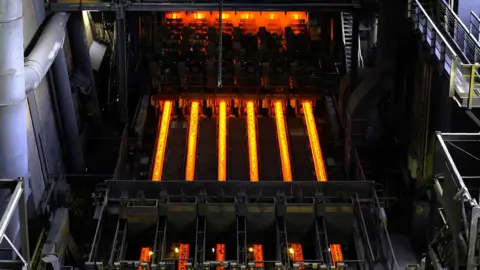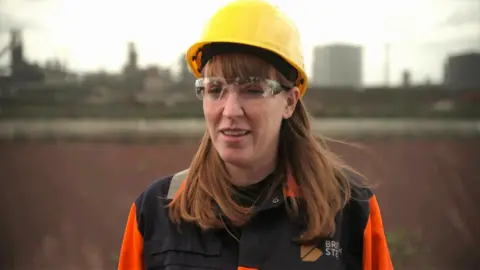No 10 'confident' British Steel furnaces will stay on
 Getty Images
Getty ImagesDowning Street has said it is "confident" the raw materials needed to keep the furnaces at British Steel's Scunthorpe site switched on will reach it in time.
The government has been attempting to source the materials needed to fuel the plant's central blast furnaces since taking control of it on Saturday, and has confirmed a shipment will arrive "in the coming days".
Ministers seized control of operations after talks with British Steel's Chinese owner Jingye broke down, and the government accused the firm of planning to switch the furnaces off.
Beijing has accused the British government of "politicising trade co-operation", and said the move raised doubts about investment in the UK.
Officials had been attempting to obtain the coking coal and iron pellets needed to keep the steel-producing furnaces running – materials which ministers have accused Jingye of selling off.
Speaking during a visit to the site on Monday, Deputy Prime Minister Angela Rayner said "everything is in place" for the furnaces to continue to fire after the materials were secured.
Prime Minister Sir Keir Starmer's official spokesman had earlier confirmed that two shipments of both materials are being held at Immingham docks, 30 miles east of Scunthorpe, and will reach the steelworks first, while a third shipment of raw materials is onboard a vessel off the coast of Africa that is making its way to the UK.
Sourcing and transporting the raw materials to the Scunthorpe plant is critical because if a blast furnace goes out, in most cases it is unable to be restarted. Even its temperature dropping too low can cause permanent damage.
An emergency law was rushed through Parliament on Saturday, giving the government control of the Lincolnshire site after it "became clear" that Jingye was intent on shutting the site.
Business Secretary Jonathan Reynolds told the House of Commons that Jingye had intended to "cancel and refuse to pay for existing orders" of raw materials, and therefore "irrevocably and unilaterally closed down" the plant.
On Monday, the government appointed two long-standing British Steel employees to run the plant on an interim basis.
The situation at British Steel has raised questions about Chinese investment in industries the UK government has deemed strategically critical.
Treasury minister James Murray told BBC Radio 4's Today programme that, while Jingye had "clearly behaved irresponsibly", the actions of one firm did not "speak to all companies who are based in China".
He also said there needed to be a "high level of scrutiny" for any foreign investment in critical infrastructure.
The UK government has so far stopped short of taking British Steel back into full public ownership, but has not ruled out nationalisation, while also looking for potential private investors to fund operations at Scunthorpe.
 UK Pool
UK PoolWhile Rayner said the government wanted to work with the company to continue production at the site, as well as explore alternative private investment, she said no option was off the table.
China's embassy in the UK has urged ministers to negotiate with Jingye to "find a solution acceptable to all parties", while its foreign ministry urged the UK government to hold further talks with Jingye.
Spokesman Lin Jian said: "It is hoped that the British government will... avoid politicising trade cooperation or linking it to security issues, so as not to impact the confidence of Chinese enterprises in going to the UK for normal investment," according to news agency AFP.
Hopes raised for site's future
On Monday morning, Roy Rickhuss, general secretary of the Community Union - which represents the majority of steelworkers - said the blast furnaces are "in a far better position" than before the government stepped in.
Mr Rickhuss told Today he was certain the plant would remain running and that the furnaces were "secure".
Charlotte Brumpton-Childs, from the GMB Union, told BBC Breakfast that she had spoken to British Steel on Sunday night and had been reassured the raw materials would be secured by the government.
The Scunthorpe plant employs 2,700 people and is the last site in the UK that can produce virgin steel - a high-grade product which is needed for large construction projects.
Without the plant, the UK would be the only member of the G7 group of leading economies without the ability to make virgin steel - which the government believes would pose a risk to the country's economic security.
The site produces the majority of rail tracks used by Network Rail. The company said it does not expect "any impact on the continued delivery of reliable rail services" as it built up a stockpile of steel in anticipation of the plant's possible closure.
The virgin steel made in Scunthorpe is also critical for large-scale infrastructure developments, such as building nuclear power plants like the ongoing Hinkley Point C project in Somerset.
However, in March, Jingye said the Scunthorpe site was losing £700,000 a day, which it said was "no longer financially sustainable", and the company began a consultation on job cuts.
Talks with Jingye last week failed to produce a breakthrough. The government said the company had demanded more than double the government's original £500m offer with few guarantees it would keep the plant open.
Speaking about the company's actions on Sunday, Reynolds said "it might not be sabotage, it might be neglect". Rayner said there was "no evidence" of corporate sabotage.
The Conservatives have criticised the government for not stepping in sooner to save the plant.
Tory shadow business secretary Andrew Griffith said the party had supported the emergency law because "it's the least worst option on the table".
